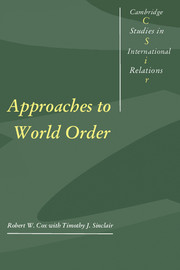Book contents
- Frontmatter
- Contents
- Preface
- Acknowledgements
- Part I Overviews
- Part II Theory
- 3 The idea of international labor regulation (1953)
- 4 Realism, positivism, and historicism (1985)
- 5 On thinking about future world order (1976)
- 6 Social forces, states, and world orders: beyond international relations theory (1981)
- 7 Gramsci, hegemony, and international relations: an essay in method (1983)
- 8 Towards a posthegemonic conceptualization of world order: reflections on the relevancy of Ibn Khaldun (1992)
- 9 “Take six eggs”: theory, finance, and the real economy in the work of Susan Strange (1992)
- Part III Interpretations
- Part IV Multilateralism
- Complete bibliography of works by Robert W. Cox to 1995
- Index of names
- Index of subjects
- CAMBRIDGE STUDIES IN INTERNATIONAL RELATIONS
7 - Gramsci, hegemony, and international relations: an essay in method (1983)
Published online by Cambridge University Press: 05 June 2012
- Frontmatter
- Contents
- Preface
- Acknowledgements
- Part I Overviews
- Part II Theory
- 3 The idea of international labor regulation (1953)
- 4 Realism, positivism, and historicism (1985)
- 5 On thinking about future world order (1976)
- 6 Social forces, states, and world orders: beyond international relations theory (1981)
- 7 Gramsci, hegemony, and international relations: an essay in method (1983)
- 8 Towards a posthegemonic conceptualization of world order: reflections on the relevancy of Ibn Khaldun (1992)
- 9 “Take six eggs”: theory, finance, and the real economy in the work of Susan Strange (1992)
- Part III Interpretations
- Part IV Multilateralism
- Complete bibliography of works by Robert W. Cox to 1995
- Index of names
- Index of subjects
- CAMBRIDGE STUDIES IN INTERNATIONAL RELATIONS
Summary
Some time ago I began reading Gramsci's Prison Notebooks. In these fragments, written in a fascist prison between 1929 and 1935, the former leader of the Italian Communist Party was concerned with the problem of understanding capitalist societies in the 1920s and 1930s, and particularly with the meaning of fascism and the possibilities of building an alternative form of state and society based on the working class. What he had to say centered upon the state, upon the relationship of civil society to the state, and upon the relationship of politics, ethics, and ideology to production. Not surprisingly, Gramsci did not have very much to say directly about international relations. Nevertheless, I found that Gramsci's thinking was helpful in understanding the meaning of international organization with which I was then principally concerned. Particularly useful was his concept of hegemony, but valuable also were several concepts which he had worked out for himself or developed from others. This essay sets forth my understanding of what Gramsci meant by hegemony and these related concepts, and suggests how I think they may be adapted, retaining his essential meaning, to the understanding of problems of world order. It does not purport to be a critical study of Gramsci's political theory but merely a derivation from it of some ideas useful for a revision of current international relations theory.
- Type
- Chapter
- Information
- Approaches to World Order , pp. 124 - 143Publisher: Cambridge University PressPrint publication year: 1996
- 17
- Cited by

